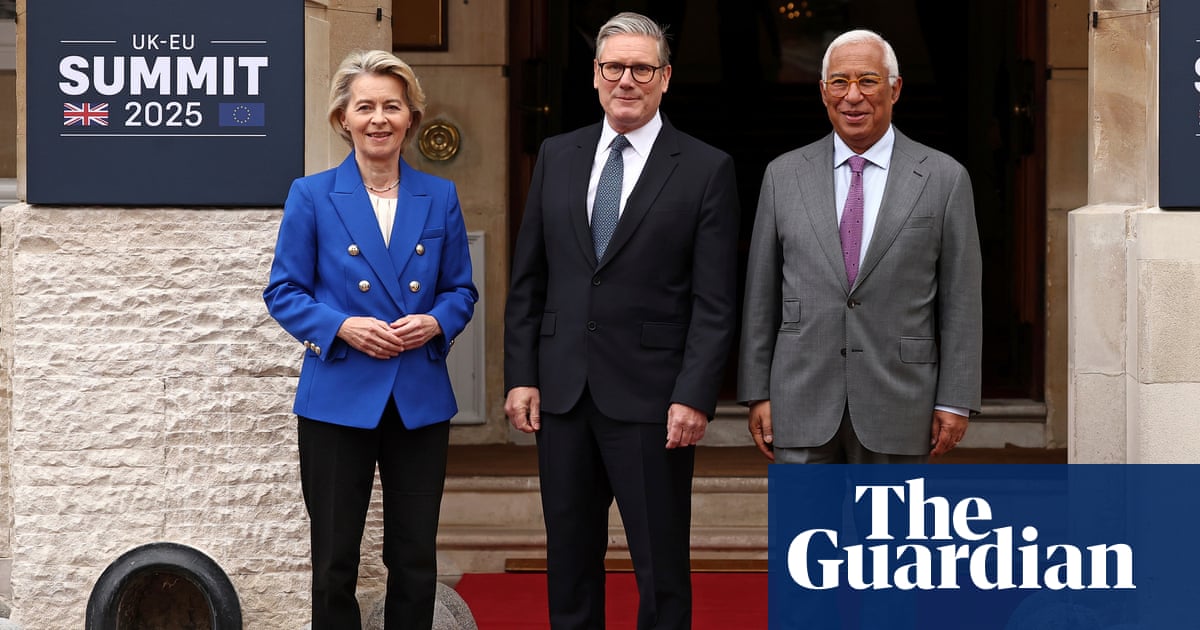A deal clinched between the UK and EU to remove checks on agrifoods will add £9bn to the UK economy and lower food prices, No 10 has said, as the last-minute agreement was clinched early on Monday morning.
The deal – which will grant EU fishers access to British waters for an additional 12 years – will remove checks on a significant number of food products as well as a deeper defence partnership and agreements on carbon taxes.
The UK said the deal would make “food cheaper, slash red tape, open up access to the EU market”. But the trade-off for the deal was fishing access and rights for an additional 12 years – more than the UK had offered – which is likely to lead to cries of betrayal from the industry.
Officials have hit back at the criticism, arguing that the food standards deal will have huge benefit for fish and seafood exports.
The two sides will also begin talks for a “youth experience scheme”,first reported in the Guardian, which could allow young people to work and travel freely in Europe again and mirror existing schemes the UK has with countries such as Australia and New Zealand.
The UK said it would be “capped and time-limited”, though there is no agreement yet from the EU on the details.
Keir Starmer and the European Commission president,Ursula von der Leyen, shook hands on the reset deal at Lancaster House just hours after negotiators finished the final three texts.
“It’s time to look forward. To move on from the stale old debates and political fights to find common sense, practical solutions which get the best for the British people,” Starmer said. “We’re ready to work with partners if it means we can improve people’s lives here at home.
“So that’s what this deal is all about – facing out into the world once again, in the great tradition of this nation. Building the relationships we choose, with the partners we choose, and closing deals in the national interest. Because that is what independent, sovereign nations do.”
Central to the agreement is the new agrifoods deal, known as an SPS agreement, which removes red tape on food and drink exports, removing some routine checks on animal and plant products completely. In return, the UK will accept some dynamic alignment on EU food standards and a role for the European court of justice in policing the deal.
The deal will not be time-limited, as had originally been demanded by the EU. It was for this that the UK made a major concession for a longer-term deal on fishing, extending the current access for European fishing to UK waters until 2038, having originally offered until 2030. The original trade deal with the EU had suggested there would be annual negotiations from 2026, but the government said this fixed deal would give certainty.
A UK government official said the deal for the UK fishing industry was about “protecting their rights and long-term security instead of the merry-go-round of yearly renegotiations that would never plausibly see EU boats leave UK waters”.
The government said it would put £360m of modernisation support back into coastal communities as part of the deal, a tacit acknowledgment of the concession.
But UK officials said the SPS deal would be a major win for British consumers and should lead to lower food prices and more choice in the supermarkets.
It will mean certain products are allowed to be sold in the EU for the first time since Brexit, such as some burgers and sausages, after the 21% drop in exports and 7% drop in imports seen since Brexit.
Another agreement reached before the Lancaster House summit will be on linking emissions trading, which the UK said would avoid businesses being hit by the EU’s carbon tax due to come in next year.
Sign up toFirst Edition
Our morning email breaks down the key stories of the day, telling you what’s happening and why it matters
after newsletter promotion
The deal also protects British steel imports from new EU tariffs through a bespoke arrangement, saving about £25m a year.
British holidaymakers will also be ableto use European gates at airports, ending long holiday queues to use the gates for non-European citizens, and pet passports will be introduced to eliminate the need for animal health checks on each trip.
The UK will also now enter formal talks on a number of key topics, including a youth mobility deal, to grant visas for younger Britons and Europeans as well as re-entry to the Erasmus scheme.
There will be future talks, too, on access to the EU facial recognition data, a key ask of Starmer as a way of tackling cross-border crime and people-trafficking gangs.
But there will be no immediate entry for the UK to the EU’s €150bn defence fund to allow UK arms companies to bid for contracts – though the UK said the deal struck on Monday would pave the way for that to happen in the coming months.
The UK’s chief negotiator, Nick Thomas-Symonds, the cabinet office minister, said: “Today is a historic day, marking the opening of a new chapter in our relationship with the EU that delivers for working people across the UK.
“Since the start of these negotiations, we have worked for a deal to make the British people safer, more secure and more prosperous. Our new UK-EU Strategic Partnership achieves all three objectives. It delivers on jobs, bills and borders.
“Today is a day of delivery. Britain is back on the world stage with a government in the service of working people.”
